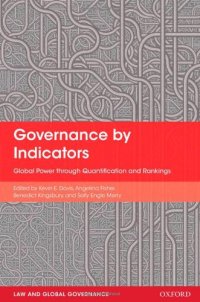
Ebook: Governance by Indicators: Global Power through Classification and Rankings
- Tags: Law Administrative Biographies Business Constitutional Criminal Dictionaries Terminology Environmental Natural Resources Estate Planning Ethics Professional Responsibility Family Foreign International Health Medical Intellectual Property Practice Legal Education History Self Help Theory Systems Media the Philosophy Rules Procedures Specialties Tax Reference Test Preparation Almanacs Yearbooks Atlases Maps Careers Catalogs Directories Consumer Guides Thesauruses Encyclopedias Subject English as a
- Series: Law and Global Governance
- Year: 2012
- Publisher: Oxford University Press
- Edition: 1
- Language: English
- pdf
The use of indicators as a technique of global governance is increasing rapidly. Major examples include the World Bank's Doing Business Indicators, the World Bank's Good Governance and Rule of Law indicators, the Millennium Development Goals, and the indicators produced by Transparency International. Human rights indicators are being developed in the UN and regional and advocacy organizations. The burgeoning production and use of indicators has not, however, been accompanied by systematic comparative study of, or reflection on, the implications, possibilities, and pitfalls of this practice.
This book furthers the study of these issues by examining the production and history of indicators, as well as relationships between the producers, users, subjects, and audiences of indicators. It also explores the creation, use, and effects of indicators as forms of knowledge and as mechanisms of making and implementing decisions in global governance. Using insights from case studies, empirical work, and theoretical approaches from several disciplines, the book identifies legal, policy, and normative implications of the production and use of indicators as a tool of global governance.
This book furthers the study of these issues by examining the production and history of indicators, as well as relationships between the producers, users, subjects, and audiences of indicators. It also explores the creation, use, and effects of indicators as forms of knowledge and as mechanisms of making and implementing decisions in global governance. Using insights from case studies, empirical work, and theoretical approaches from several disciplines, the book identifies legal, policy, and normative implications of the production and use of indicators as a tool of global governance.
Download the book Governance by Indicators: Global Power through Classification and Rankings for free or read online
Continue reading on any device:

Last viewed books
Related books
{related-news}
Comments (0)